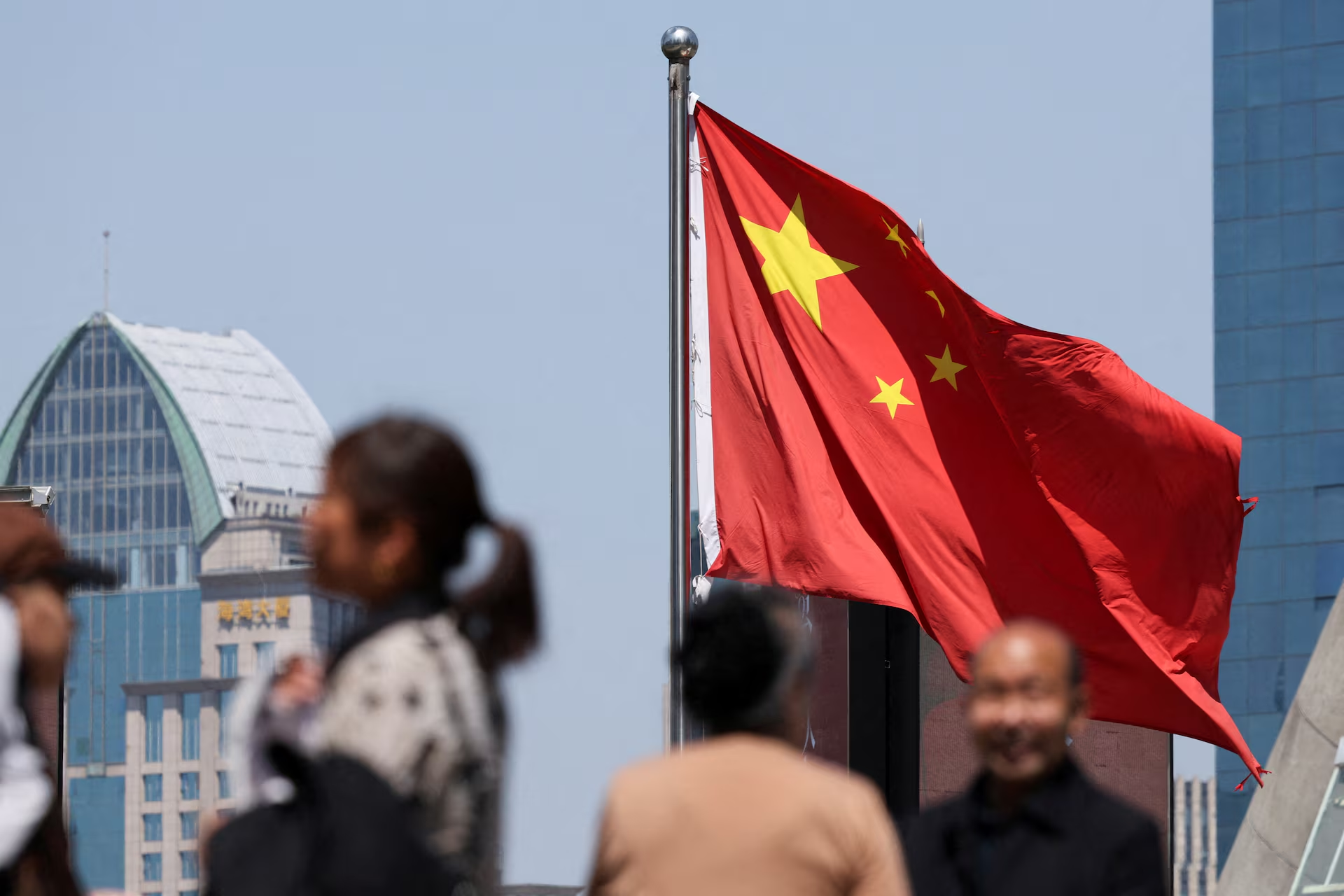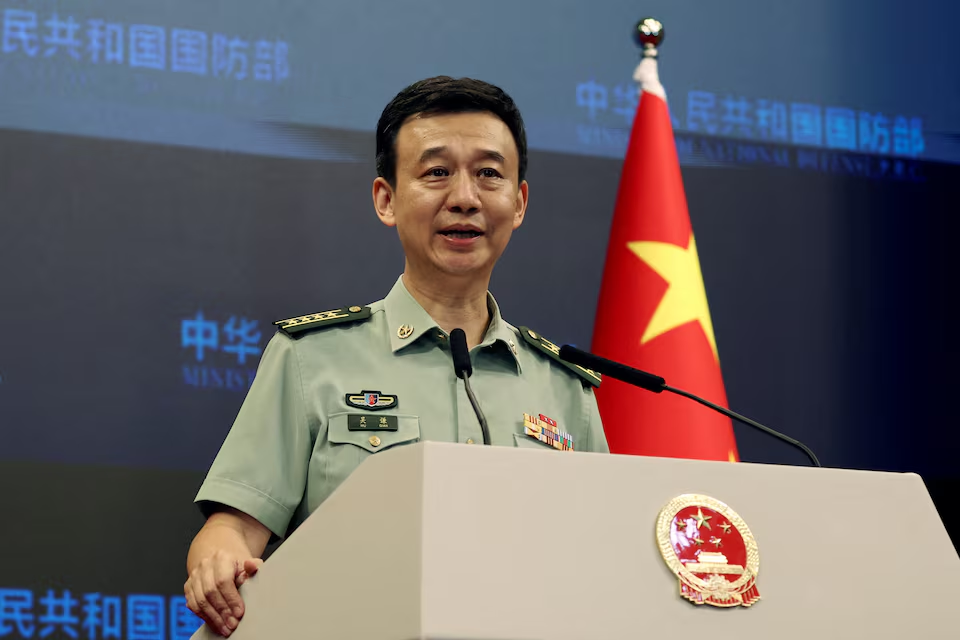中美贸易战升级背景下,中国散户投资者基于爱国情绪涌入股市“抄底护盘”。广东设计师曹明杰等普通投资者首次入市,宣称“目标不是赚钱,而是为国家出一份力”。资金集中流向国防、半导体等国家战略板块,ETF获得2300亿元净流入。散户与“国家队”形成合力,推动A股从4月低点反弹8%,跑赢同期美股。这种现象反映民间对贸易战的民族主义回应,但也存在非理性繁荣风险。投资者将股市博弈视为“没有硝烟的战争”,部分人甚至抵制美国品牌。虽然短期内稳定了市场,但长期仍需基本面改善和政策平衡。这一行为凸显资本市场在中美博弈中的战略意义,其可持续性取决于经济实质改革成效。
— 本文由AI智能分析生成摘要,仅供参考。

SHANGHAI/SINGAPORE, April 22 (Reuters) – Cao Mingjie had never traded stocks before Donald Trump’s “Liberation Day”.
上海/新加坡4月22日电(路透社)——在唐纳德·特朗普的“解放日”之前,曹明杰从未交易过股票。
The home designer from China’s southern Guangdong province changed his mind after April 2, when the U.S. president announced “reciprocal tariffs”, intensifying a trade war with his country.
来自中国南方广东省的家居设计师在4月2日之后改变了主意,当时美国总统宣布了”对等关税”,加剧了与他所在国家的贸易战。
Keen to show solidarity with Beijing, Cao decided he would invest 2,000 yuan ($274) in the local stock market every month.
为了表达对北京的声援,曹决定每月向本地股市投资2000元(274美元)。
“The goal isn’t to make money. It’s about contributing to my country,” said Cao. He said he opened trading accounts after the higher tariffs hit Chinese stocks. In this trade war, “every individual should stand by the country until the end”.
“目标不是赚钱,而是为祖国做贡献。”曹表示。他称在关税提高冲击中国股市后,自己开设了交易账户。在这场贸易战中,”每个中国人都应和国家站在一起,坚持到底”。
Like Cao, many retail investors are joining the state-backed “national team” to defend the stock market – another battlefield in the broadening Sino-U.S. conflict, traders and brokers say. Buying has been focused on sectors set to benefit from China’s national agenda, such as defence, consumer and semiconductors.
和曹一样,许多散户投资者正加入国家支持的”国家队”来护盘股市——交易员和经纪人表示,这是不断扩大的中美冲突中的另一个战场。资金主要流向受益于国家战略的板块,如国防、消费和半导体行业。
The patriotic fervour is unusual in small investors, notorious for their casino mentality, and a welcome change for authorities seeking to counter the panic caused by the trade war and stabilise capital markets.
散户投资者素来以赌场心态著称,如今却呈现出不同寻常的爱国热情,这对于力图缓解贸易战恐慌、稳定资本市场的监管机构而言,无疑是个可喜的变化。
Since the rout on April 4, China’s share markets have received 45 billion yuan in net retail inflows, data from financial information provider Datayes shows. That compares with six straight sessions of outflows totalling 91.8 billion yuan ahead of Trump’s “Liberation Day”.
金融信息提供商万得数据显示,自4月4日市场重挫以来,中国股市已录得450亿元零售资金净流入。此前在特朗普所谓”解放日”前夕,市场曾遭遇连续六个交易日共计918亿元的资金流出。
Previously, private and state investors clashed during the 2015 market crash and in the aftermath of Beijing’s crackdown of technology companies, undermining market rescue efforts.
此前,私营和国有投资者曾在2015年市场崩盘期间和北京对科技行业展开整顿后发生冲突,破坏了救市努力。
But now, their interests appear aligned as Trump threatens eye-popping import tariffs that China has described as “bullying”, even if some retail investors are merely opportunistic and riding on Beijing’s swift and resolute intervention.
但目前,他们的利益看似一致,因为特朗普威胁要实施令人瞠目的进口关税(中国称之为”霸凌行径”),尽管部分散户投资者只是出于投机心理,企图搭乘北京迅速而果断的干预措施的顺风车。
As China stocks plunged 7% on April 7, state-backed institutional investors publicly vowed to buy more shares, top Chinese brokerages pledged to steady prices, and a slew of listed companies unveiled share buyback plans.
4月7日A股重挫7%之际,国有机构投资者公开承诺将加大买入力度,中国头部券商发声力保市场稳定,更有逾30家上市公司集中推出回购计划。
Last week, Chinese Premier Li Qiang urged government officials to strengthen efforts to steady, opens new tab the stock market.
中国国务院总理李强上周敦促政府官员加大稳定股市的力度。
China’s stock market (.SSEC), opens new tab has bounced 8% from seven-month lows hit early April, and is down just 1.3% so far this month. That compares with a slump of more than 8% for U.S. stocks (.SPX)
中国股市(.SSEC)已从4月初触及的七个月低点反弹8%,本月迄今累计下跌1.3%。相比之下,美国股市(.SPX)同期则大跌逾8%。
“We think China’s A-share market is of greater strategic importance,” said Meng Lei, China equity strategist at UBS Securities. Patriotic bets have “meaningfully improved investor sentiment”, Meng said.
瑞银证券中国股票策略师孟磊表示,”我们认为中国A股市场更具战略重要性”。孟磊称,爱国押注”显著提振了投资者情绪”。
‘BEING PATRIOTIC MEANS HOLDING ON’
“爱国意味着坚守”
Zhou Lifeng, from China’s northwestern Ningxia region, has vowed to pour more cash into stocks even if he incurs losses.
中国西北宁夏地区的周立峰誓言,即便亏损也将向股市投入更多资金。
“Being patriotic means holding on to your stocks,” said Zhou, a mountain climber. Zhou said he owns mostly consumer and defence stocks worth 3 million yuan and has 7 million yuan cash in his war chest.
登山爱好者周先生说:”爱国就是要守住手里的股票。”他表示,自己目前持有价值300万元的股票,主要是消费和国防类股票,手头还持有700万元现金作为”弹药”。
Restaurant operator Shu Hao said he had also invested several million yuan in Chinese shares and that he was inspired by efforts made by domestic retail giants to help exporters bruised by the trade war.
餐馆经营者舒浩表示,他也投入了数百万元人民币购买中国股票,并受到国内零售巨头为帮助在贸易战中受挫的出口商而采取的措施启发。
JD.com (9618.HK), Alibaba-owned Freshippo, and supermarket operators CR Vanguard and Yonghui Superstores (601933.SS), have announced measures to help exporters pivot to the local market.
京东(9618.HK)、阿里巴巴旗下盒马鲜生、超市运营商华润万家及永辉超市(601933.SS)已宣布将采取措施帮助出口商转向本土市场。
“People are expressing patriotism in various ways,” said Shu. He said he had bought technology and consumer shares.
“人们正以各种方式表达爱国情怀,”舒说道。他表示自己已买入科技和消费类股票。
The stocks and sectors people are buying into reflects nationalistic pride. They are mostly areas in which Beijing has self-sufficiency targets or have local champions that are being shut out of global markets due to the tariffs.
人们当前买入的股票和行业板块,折射着民族自豪感的投射。这些标的主要集中在国家明确自主可控目标的领域,或是那些因关税壁垒被隔绝于全球市场之外的本土龙头企业。
Reflecting this, consumer (.CSI000990),and chipmaking (.CSI931865), shares have risen since Trump’s “Liberation Day” despite weaker broader markets, while tourism (.CSI930633),and agriculture-related shares (.CSI930910), have recovered quickly.
消费者板块(.CSI000990)和芯片制造板块(.CSI931865)在特朗普宣布”解放日”后逆势上涨,尽管大盘走势疲弱;旅游板块(.CSI930633)及农业相关板块(.CSI930910)则已快速收复失地。
Exchange-traded funds, an increasingly popular investment conduit in China, have received piles of money.
交易所交易基金这一在中国日益流行的投资渠道,已吸引了大量资金流入。
Since the April 7 slump, Chinese ETFs have received more than 230 billion yuan of flows, pushing the total size of the segment past 4 trillion yuan for the first time, state media has reported. The data does not show how much of those inflows were from retail investors, versus the “national team”.
自4月7日市场下挫以来,境内股票ETF累计获得超2300亿元资金净流入,推动股票ETF总规模首次突破4万亿元关口,官方媒体报道称。相关数据未能反映这些资金流入中有多少来自散户投资者,又有多少来自”国家队”。
‘WAR … WITHOUT GUN SMOKE’
没有硝烟的战争
Patriotism is also reshaping the portfolio of some professional investors.
爱国主义也在重塑一些专业投资者的投资组合。
Hedge fund manager Yang Tingwu said he ploughed all the cash left in his portfolio into stocks.
对冲基金经理杨廷武表示已将投资组合中剩余的现金全部投入股市。
“This is war, only without gun smoke,” Yang, portfolio manager at Tongheng Investment said, referring to the spiralling trade conflict between China and the U.S. that has seen tit-for-tat levies surging past 100%.
“这是一场战争,只是没有硝烟,”同亨投资的投资组合经理杨表示。他指的是中美之间不断升级的贸易冲突,双方针锋相对的关税已飙升超过100%。
“You’re placing bets not just on your portfolio, but also on the fate of your country,” said Yang, who has wagered on farming, energy, finance and defence stocks.
“你押注的不仅是自己的投资组合,还有国家的命运,”已押注于农业、能源、金融和国防类股票的杨某表示。
Founder of Shanghai-based Minority Asset Management, Liam Zhou, said he had invested his $1 billion portfolio entirely in China stocks.
上海少数派资产管理公司创始人周良表示,他已将10亿美元的资产全部投入了中国股票。
The trade war has even turned some Chinese investors nationalistic.
贸易战甚至让一些中国投资者变得民族主义。
“My portfolio is bleeding, but I don’t care. I’ll stand firm with the government in the fight against U.S. bullying,” said Nancy Lu, a teacher in eastern Jiangsu province. She vowed to never go to Starbucks or wear Nike again, in a boycott of American brands.
“我的投资组合亏惨了,但我不在乎。在对抗美国霸凌的斗争中,我将坚定地和政府站在一起。”江苏省东部的教师南希·卢表示。她誓言再也不去星巴克、不穿耐克,加入到对美国品牌的抵制中。
“I won’t sell a single stock. I’ll help defend the market for our country. I have never felt so proud as a retail investor,” she added.
“我一股都不会抛售。我要为国家护盘。作为一名散户投资者,我从未感到如此自豪过,”她补充说。
本文编译于路透社,由Samuel Shen and Tom Westbrook提供。
特别声明:本文为学术研究和合理使用为目的的编译,原文版权归属于原作者,侵权删除请联系[email protected]
龙旗解析
路透社文章《“For our country”: China’s patriots are buying the dip》聚焦于中美贸易战升级背景下,中国散户投资者基于爱国情绪涌入股市“抄底护盘”的现象。这一行为既反映了民间对国家战略的响应,也揭示了资本市场与地缘政治博弈的复杂互动。以下从驱动逻辑、行为特征、市场效应及潜在风险三个维度展开解读:
©2025龙旗领地版权所有。未经许可,请勿转载使用。
一、驱动逻辑:民族情绪与政策托底的共振
1.贸易战激发的民族主义叙事
中美关税战升级(如特朗普政府将部分商品关税提高至100%以上)直接冲击市场信心,但同时也激发了散户的“护盘”责任感。例如,广东设计师曹明杰每月投入2000元购买A股,宣称“目标不是赚钱,而是为国家出一份力”。这种情绪与“抵制美国品牌”(如星巴克、耐克)的消费行为形成联动,构成“经济战”的民间响应。
2.政策信号与“国家队”行动的引导
政府通过“平准基金”预期、央企增持回购(如中石油、中石化等央国企投入300亿资金护盘)释放托市信号,散户将此解读为“国家需要”的动员令。例如,中央汇金增持ETF、央行提供股票回购再贷款等举措,强化了市场对政策底部的信心。这种官民协同的护盘模式,实质上是将资本市场博弈嵌入国家叙事框架。
3.经济安全逻辑下的投资转向
投资者聚焦与国家战略高度相关的板块:
国防军工(如中兵红箭):应对地缘冲突风险;
半导体(如中芯国际产业链):突破技术封锁;
消费内需(如比亚迪、永辉超市):对冲出口受阻。
这种选择既符合“国产替代”政策导向,也契合散户对“国家命运共同体”的认知。
二、行为特征:从“赌徒心态”到“政治化投资”
1.投资动机的意识形态化
传统散户以短期套利为主,但此轮入市行为被赋予“对抗美国霸权”的象征意义。例如,宁夏投资者周立峰称“爱国就是死守股票”,即使亏损仍加仓;上海私募经理周晔将10亿美元全仓A股,称“为国家守住市场”。这种动机超越了经济理性,成为身份认同的表达。
2.资金流向的结构性集中
资金主要流向两类标的:
政策扶持领域:如ETF(4月7日后涌入2300亿元)、半导体及新能源;
被关税压制的本土龙头:如因出口受阻转向内销的制造业企业。
数据显示,4月初散户净流入450亿元,逆转此前918亿元的净流出,形成“情绪底”与“市场底”的共振。
3.社交媒体的动员效应
爱国投资通过抖音、微博等平台扩散,形成“为国炒股”的群体认同。例如,网红号召购买外贸转内销商品,电商平台配合宣传“支持国货”,进一步将投资行为与民族自豪感绑定。
三、市场效应与潜在风险
1.短期托市效果显著
散户与“国家队”合力下,A股从4月初低点反弹8%,跑赢同期下跌8%的美股。政策工具(如印花税减半、融资放宽)与情绪共振短期内稳定了市场预期。
2.长期结构性问题未解
估值扭曲风险:非理性资金推高特定板块(如国防PE达60倍),可能加剧泡沫;
政策依赖症:若贸易战缓和或经济数据不及预期,情绪退潮可能导致剧烈波动;
外资观望:尽管部分机构(如瑞银)肯定战略意义,但多数外资仍担忧政策不确定性。
3.“爱国叙事”的双刃剑效应
一方面,凝聚市场信心;另一方面,可能掩盖企业基本面问题(如部分科技股盈利疲软)。此外,抵制美企的“爱国消费”可能误伤在华产业链(如苹果代工厂)。
结论:资本市场作为“新战场”的隐喻
路透社揭示的不仅是投资现象,更是中美博弈下中国社会动员机制的缩影。散户的“护盘”行为,实质是将资本市场纳入“总体战”范畴,通过资金流动传递政治信号。然而,这种模式的可持续性取决于两点:
政策工具与市场规律的平衡:若过度依赖情绪驱动,可能削弱资源配置效率;
经济基本面的实质改善:仅靠爱国热情难以替代技术创新与消费复苏。
历史对照:此情景类似2008年金融危机时的“政策市”,但当前叠加了更复杂的意识形态对抗。若中国能借此推动结构性改革(如科技自主、内需扩张),或为长期竞争力注入新动能;若陷入非理性繁荣,则可能延缓市场化进程。



评论列表 (0条):
加载更多评论 Loading...